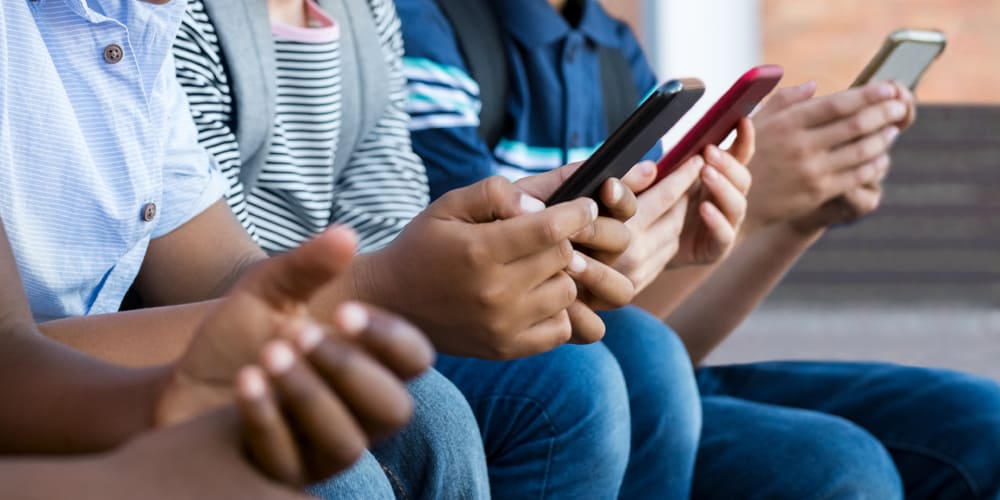Does My Child Need a Cell Phone?

My eldest started middle school this month, and it’s a brave new world for us all. How is twelve years long enough to turn a burrito-sized nugget of precious new life into a tween with a locker combination and algebra textbooks?
Along with the learning curves of changing classrooms, complex social interactions, and harder academic expectations, one of the most surprising hurdles of the past month has been the unspoken expectation—from peers, teachers, and coaches—that middle schoolers own a cell phone.
Math assignments are sent via texting apps. Friends arrange hang-out times on social media. When practice is cancelled because of rain (rather than moved inside as planned), how does he get in touch with me for a ride 60 minutes earlier than expected? If he’s hanging out with new friends, then wants (or needs) to flee the scene, how does he call home? We’re just a month into this new level of independence and we’ve already encountered so many logistical (and safety) reasons to consider phone shopping.
Thinking back to my own middle- and high-school years, I realize my parents and I solved these same problems the old-fashioned way: pay phones. With a calling card, a few quarters, or the good old collect call I could update my parents on my location and ETA no matter where I was.
But these dinosaur-era machines are long gone now.
There are a million reasons why a 12- to 14-year-old could (and should) spread her wings, launch out, explore the world without parents. And yet, I never want my still-developing child to find himself in a situation where he’s unsafe with no way to reach out for help.
These are just some of the reasons why, in 2010, 69% of 11- to 14-year-olds owned a cell phone; there’s reason to expect that this number has grown in the nearly 10 years since that survey was taken.
But for every moment I wish my son had a cell phone in his pocket, there are a thousand reasons I’m glad he doesn’t (yet). There are health risks associated with cell phones; researchers are still uncertain what long-term implications radiation exposure from heavy cell use creates—especially on children whose brain cells are still developing. Studies have suggested that teens who own phones get fewer—and less productive—hours of sleep, during a life stage that relies on sleep for development.
Then there are mental health concerns. Cell phones open doors to addiction, concentration problems, and cyber bullying to name just a few. Significantly higher rates of depression and suicide have been linked to teen smartphone usage, regardless of how the devices are being used. Plus, there are many ways trouble can find someone on the internet, especially someone who is still developing social and emotional maturity. Middle school is trouble enough without throwing my child into yet another new social experiment.
It’s an expensive plunge to make, too.
So here I stand, one month into the school year, with a scale piled high with reasons to buy a phone, just slightly tipped by the heap of reasons not to buy a phone.
I have a feeling I’m not the only parent weighing these heavy options.
However the scales tip for you, here are some basics I’m certain matter either way:
Be the Parent. At this age, our kids are still trying out their skills, their sense of self, and their maturity. With phones and without them, they need us to teach, remind, redirect, and coach them. This is the season for them to practice life skills, not launch out into the world without a parent’s support.
Balance safety with independence. Walking home from soccer practice alone (without a phone) is a new level of independence, but so is walking around with a phone in your pocket. There are safety concerns either way. Keep an open conversation going about wise decisions and boundaries that will allow stretching to take place in a safe environment.
Look for the third option. There’s always another way to solve problems, so get creative. Could she use your phone for assignment updates and texting friends? What about an old flip phone set up to only text pre-programmed numbers (like mom and dad, the neighbors, and Auntie Kristi)? What about checking in from the library or a friend’s house at predetermined times?
Stay informed. It’s hard to stay on top of the new apps and technologies marketed to children, but keep trying! For instance, our local police department walked us through tricks for keeping children’s phones (and locations) invisible to predators…something I wouldn’t have figured out on my own.
Keep looking to Jesus … together. The best part of these tween years for me so far is talking through these tough topics with my precious newborn burrito—newly turned into a thoughtful person with wise perspectives and grace-filled ideas. Our Good Shepherd knows how to navigate this brave new world, and thanks be to God, He’s still leading us through.
How have you answered these questions in your home? What about your school community? Your church community? How can your Awana club make it easy for tweens and teens to attend without a cell…or keep their smartphones from causing trouble?
Catherine McNiel writes to open eyes to God’s creative, redemptive work in each day. She is the author of Long Days of Small Things: Motherhood as a Spiritual Discipline (NavPress). You can find more of her work at catherinemcniel.com or (where else?) Facebook.
